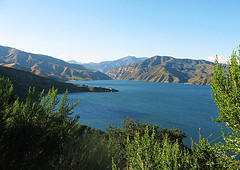|
December 9, 2006
FORESTWATCH HALTS BACKDOOR
LAND SWAP ALONG PIRU CREEK
Senate
Doesn't Pass Unfair Legislation that Would
Have
Given Away a Campground and Nearly One Mile of Piru Creek
The U.S. Senate adjourned today without
taking any action on controversial legislation that would have
ordered officials to complete an unfair land exchange on the
southeastern edge of the Los Padres National Forest in Ventura
County. The lands involved include the Lake Piru shoreline, a
nearby campground, and valuable habitat along Piru Creek - a
river found eligible for Wild & Scenic River designation.
The bill - the Los Padres National Forest
Land Exchange Act (H.R. 4162) - passed the U.S. House of
Representatives on June 13, 2006, and was awaiting action by the
Senate Committee on Energy and Natural Resources.
But faced with strong opposition from
ForestWatch and other groups, the Senate committee never acted
on the bill. Now, the Senate has adjourned until the first
session of the 110th Congress in January, spelling the bill's
demise.
The legislation required the U.S. Forest
Service to give away several parcels of land around the shore of
Lake Piru, on the southeastern edge of
 the
Los Padres National Forest near the Ventura/Los Angeles county
line. In exchange for these lands, the Forest Service would
receive other lands of much lesser value - the main reason why
ForestWatch and other groups opposed the exchange. the
Los Padres National Forest near the Ventura/Los Angeles county
line. In exchange for these lands, the Forest Service would
receive other lands of much lesser value - the main reason why
ForestWatch and other groups opposed the exchange.
Specifically, the bill ordered officials
to relinquish 440 acres of national forest land to the United
Water Conservation District, the operator of the Santa Felicia
Dam at Lake Piru. Lands to be given away included the Blue Point
Campground along Piru Creek, plus a one-mile stretch of Piru
Creek, several parcels of land along the lake's shoreline, and
all of the remaining federally-owned portions of the access road
around the lake's perimeter.
In exchange, the Forest Service would
receive 340 acres of lesser-value land in the same vicinity.
These parcels are currently owned by United Water and used for
livestock grazing.
In other words, the bill would have
mandated the trade of 440 acres of high-value waterfront lands
and a public campground for only 340 acres of dry upland grazing
pasture.
Similar legislation was introduced
in 2002, but both attempts failed, mainly because the original
legislation included a loophole that would have exempted the
exchange from environmental protection laws like the National
Environmental Policy Act.
From the beginning, the main proponent of
the bill has been the United Water Conservation District, who
wants to consolidate ownership of all lands around the lake and
along the access road. This consolidation, according to United
Water, is needed to operate the dam and lake more efficiently.
However, United Water failed to notify
ForestWatch and other interested groups about this legislation,
and didn't offer to meet with us to discuss our concerns until
after the bill had already passed the House. By then, any
changes to address our concerns would have been much more
difficult, and it left little time to make needed improvements
to the bill.
Proponents of the bill argued that there
would still be a public comment period and an environmental
review before the land exchange became final. However, the bill
identified very specific lands to be traded, and only allowed
"minor" changes to be made, and only if United Water agreed to
them. We also learned that officials would not prepare an
environmental assessment before approving the exchange.
Federal biologists have
classified Piru Creek as an "Area of High Ecological
Significance" because it provides valuable habitat for a number
of rare or at-risk animals, such as the endangered arroyo toad,
the threatened California red-legged frog, the endangered least
Bell's vireo, and the southwestern pond turtle. The U.S. Forest
Service, not United Water, is the agency best suited to
handle the special management concerns of this ecologically
sensitive area.
Piru Creek was
recently found eligible for
protection under the Wild & Scenic River Act. The bill
would have given away a one-mile stretch of this river, making
it more difficult to secure protection under the federal Wild &
Scenic Rivers Act.
The groups were also
concerned that the exchange would have interfered with ongoing
efforts to re-issue the operating license for the Santa Felicia
Dam at Lake Piru, and would have complicated efforts to provide
for passage of endangered southern steelhead at the dam.
Groups opposing the bill included
ForestWatch, Keep the Sespe Wild, Sierra Club, Center for
Biological Diversity, Friends of the Santa Clara River,
California Trout, Environmental Defense Center, Matilija
Coalition, and Ventura County Environmental Coalition.
ForestWatch does not oppose any land
exchange for the area. However, any exchange must provide for
early and meaningful opportunities for public input, must not
give away valuable habitat, must allow for changes based on the
findings of environmental studies, and must be fair to the
public.
|